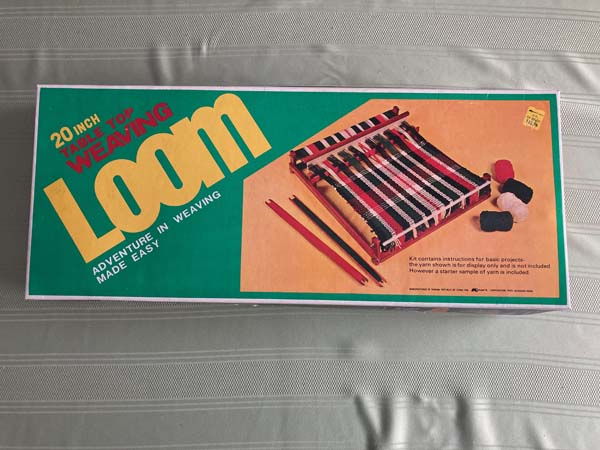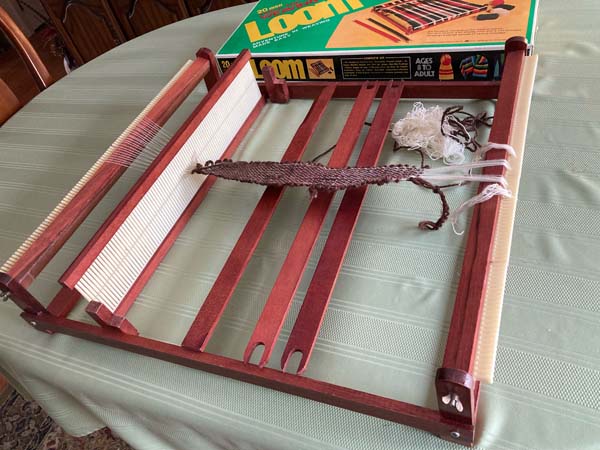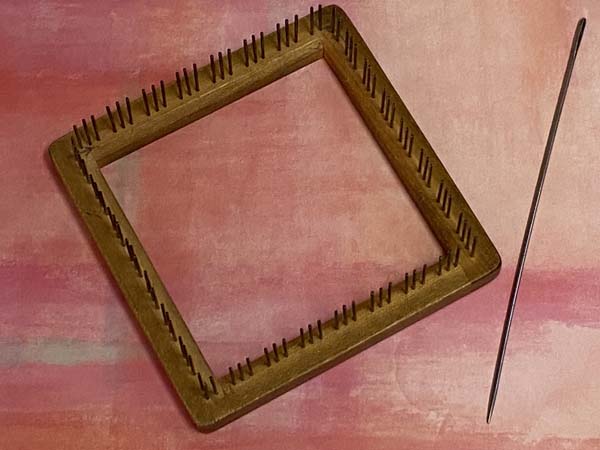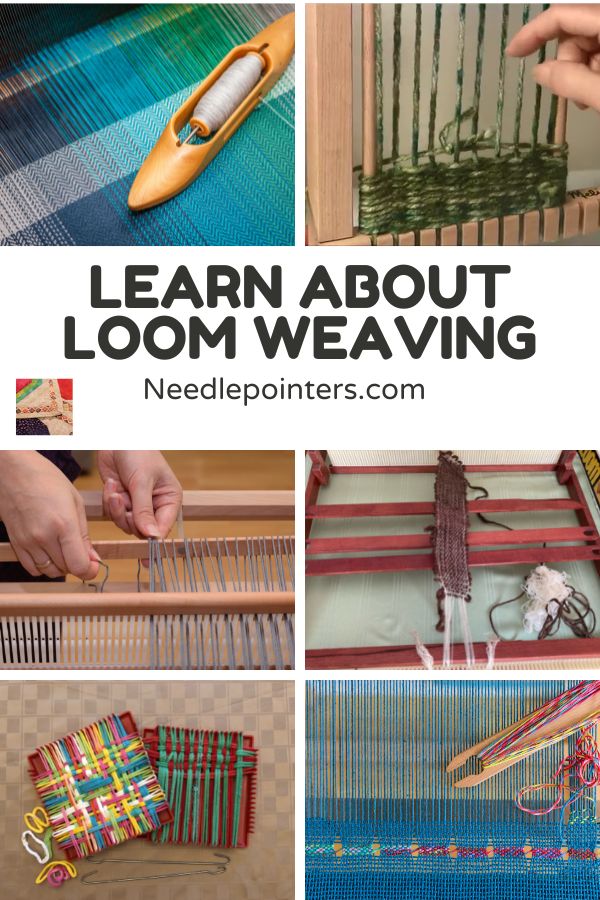I just love the whole idea of collecting wool, carding and cleaning it, spinning it, and then loom weaving with the finished textile. My cousin has my great grandmother’s spinning wheel, and she has gotten into making her own wool yarn and weaving lovely pieces on her loom.
A loom is used to weave cloth and tapestries. Its purpose is to hold the warp threads (threads going vertically) under tension so the weft threads (threads woven between the warp) can be woven over and under.
Traditional loom weaving is done by hand and takes a lot of time, unlike the factory produced woven products that are sold in stores. The traditional loom weaving is a true art skill to learn and master.
 Photo credit: Larry Heim
Photo credit: Larry Heim
What are the different types of looms?
- Backstrap loom: This loom was used by ancient civilizations and is still used in some countries. With this loom, the warp is tied around a stationary piece at one end and tied to the weaver himself at the other end. The weight of the weaver is what keeps the warp taut.
- Tapestry loom: This type of loom is a frame loom. The woven piece is limited in size to the size of the frame itself.
- Inkle loom: This is a great beginner loom. Straps and belts are woven on inkle looms, which are used to weave narrow pieces of fabric. These looms can be carried from place to place.
- Rigid-Heddle loom: This is a good loom for a beginner, much like the Inkle loom. These looms are also used by very experienced weavers to create lovely patterns. There is one rigid heddle with this loom, and it can be used to weave thicker yarns. Like the Inkle loom, it is portable.
- Table loom: Table looms are made to be put upon a table or stand and are very portable.
 Photo credit: Larry Heim
Photo credit: Larry Heim
These looms are very complex and not suggested for beginners.
- Floor loom: These freestanding looms are the largest that a person would use to hand weave at home. Floor looms can be used to make large pieces, unlike the other looms listed, but can also produce smaller fabric pieces. These are very versatile looms.
As you scroll down this page, there is a great variety of resources related to loom weaving.
The DIY Cardboard Loom by The Weaving Loom gives great instructions on how to create a temporary loom. This is a great way to see if weaving is right for you.
Tablet and inkle weaving are explained in Braid Weaving by Regia Anglorum.
The care of looms is also discussed in several articles below. This is something everyone who owns a loom should know!
Scroll down to learn more about weaving looms, weaving designs, and how to finish off the woven fabric plus much more.
 Example of a Pin Loom
Example of a Pin Loom
Once you learn all about loom weaving, go to our weaving patterns page for projects to explore!
Enjoy the art of weaving!

Supporting Products and links: Some of the links below may be affiliate links.
We make a small commission on sales through the affiliate links, at no extra cost to you. Thank you in advance
for your purchase and your support! Please see our full Affiliate
Statement for more information.
|
20" x 23" Hard Maple Loom, featuring extremely durable beam teeth! Everything you need to start weaving! Perfect for beginning weavers!
Affiliate Link to Amazon
|
|
|
Here is a tutorial on how to weave angles and waves into your project.
The Weaving Loom
|
|
|
How to make a simple box loom and weave with it.
Tinker Lab
|
|
|
Two methods, tablet weaving and inkle weaving, are discussed.
Regia Anglorum
|
|
|
|
|
Card weaving, also known as tablet weaving, is a method of producing narrow textiles such as straps, belts and trim. Here you will learn the material, set-up, weaving, and finishing technique for tablet weaving.
Phiala's String Page
|
|
|
Text and illustrations on card weaving.
Hollow Top
|
|
|
What is card weaving? Card weaving lets you make beautiful bands.
The Loomy Bin
|
|
|
Learn the proper way to care for your weaving loom.
Wool Festival
|
|
|
|
|
For those that want to try weaving, but don’t have to spend money on a loom before they know if you like it. With this post, learn how to make a temporary loom or a second loom.
The Weaving Loom
|
|
|
Learn how to finger weave with step-by-step instructions and photographs.
wikiHow
|
|
|
Here you will find free weaving projects for kids and adults to enjoy.
Needlepointers.com
|
|
|
How to make a nice finish on your weave without tying off your warp ends - use the hem stitch. Learn how here.
The Weaving Loom
|
|
|
|
|
A step-by-step instructional and photo tutorial on how to weave a herringbone design.
The Weaving Loom
|
|
|
A very basic tutorial on how to start weaving with a Melissa & Doug weaving loom. This is an excellent tutorial for teaching a beginner or child how to weave using a loom.
|
|
|
An inkle loom is relatively easy to build. Learn how to build an Inkle loom with these free step-by-step instructions.
Makezine
|
|
|
Instructions on the warping and weaving process on a lnkle loom.
Palmer Looms
|
|
|
|
|
An inkle loom can be used to weave many different items and techniques. Learn how to build one with these step-by-step instructions.
Instructables
|
|
|
A video about and how to weave on a Schacht inkle loom.
You Tube
|
|
|
Complete instructions and information on the inkle weaving.
Earth Guild
|
|
|
Perfect for Weaving: Carpet, Tapestry, Rug, Blanket or Pattern - Warping Thread for Any Loom. Many colors. Premium 50/50 blend of cotton and polyester warp thread / yarn.
Affiliate Link to Amazon
|
|
|
|
|
Includes adjustable wooden loom, oversize wooden needle, craft materials, illustrated design booklet, 91 yards (83 m) of rainbow yarn. Instructions for making four projects.
Affiliate Link to Amazon.com
|
|
|
This introduction will give you an overview of both floor looms and table looms, and how they differ from each other.
Gist Yarn
|
|
|
Weaving and Spinning gallery, hints, tips, chat, and MORE!
|
|
|
This step-by-step tutorial teaches how to make a gorgeous cushion by peg loom weaving.l
Gathered How
|
|
|
|
|
Learn a method for joining pin loom squares together.
Fiber Feast
|
|
|
How to use the mattress stitch to join pin loom squares.
Handwoven Magazine
|
|
|
How to weave with a pin loom.
Little Looms
|
|
|
Harrisville 7-inch metal loom kit makes beautiful 6” x 6” potholders. Kit includes 1 7"x 7” metal loom, 1 plastic hook, 1 set of cotton loops, and illustrated instructions.
Don't forget to buy loop refill packages so you can make more potholders.
Affiliate Link to Amazon
|
|
|
|
|
Rigid heddle looms are a perfect gateway to learning the wide and wonderful world of weaving. Learn about the rigid heddle loom.
Gist Yarn
|
|
|
How to hand dye roving.
Gleason's Fine Woolies Ranch
|
|
|
The soumak weave pattern creates a bubbled or chunky effect on the weaving. This video tutorial and photo tutorial show the soumak weaving technique.
Fiber and Design
|
|
|
Here is a free tutorial on how to plain weave, also known as a tabby weave. It's created by alternating warp threads while adding the weft yarns. And is a good beginner weaving pattern for beginners.
Fibers and Design
|
|
|
|
|
This blog post introduces the equipment and yarn you'll need to get started with tapestry weaving.
Gist Yarn
|
|
|
A twill weave pattern creates a diagonal pattern. Here is a video and also row-by-row instructions for weaving a twill pattern. Weaving twill in two directions will create an arrow form, creating the chevron weave pattern.
Fiber and Design
|
|
|
Here is a free calculator to determine the amount of yarn needed for a weaving project.
Schacht Spindle
|
|
|
This blog post explains how to choose the best warp yarn when weaving.
Gist Yarn
|
|
|
|
|
This site has a weaving program that you can use to design weave structures and color compositions. In addition it has a yarn calculator.
The Loomy Bin
|
|
|
How to do begining Soumak weaving.
Gleason's Fine Woolies Ranch
|
|
|
Here is a free, easy calculator to help you calculate how much yarn you will need for a project.
Gist Yarn
|
|
|
Calculate warp length required, width in reed, and warp and weft materials needed to complete a project.
Weaving with Janet Dawson
|
|
|
|
|
Weaving Calculator allows you to count how much yarn is required for the wrap and the weft of a weaving project on your floor loom or table loom.
Apple Apps Store
|
|
|
Simply fill in the boxes to calculate the amount of warp and weft yarn needed for a project.
Poff Studio
|
|
|
Weaving yarn sizes and their naming system will help you choose the best yarn for your weaving projects. Learn about weaving yarn sizes here.
Gist Yarn
|
|
|
This article explains the equipment and process for inkle weaving.
Wikipedia
|
|
|
This blog post explains each of these of the above common weaving terms and explains how to calculate all three so you can start weaving with confidence.
Gist Yarn
|
|